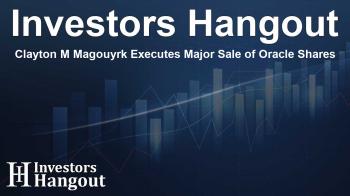Clayton M Magouyrk Executes Major Sale of Oracle Shares

Clayton M Magouyrk Executes Major Sale of Oracle Shares
In a significant maneuver, Clayton M Magouyrk, the Chief Executive Officer at Oracle (NYSE: ORCL), has made headlines by offloading a substantial amount of stock through a recent SEC filing. This bold move, publicly recorded, has caught the attention of the market analysts and investors alike.
Details of the Transaction
According to the Form 4 filing made available, it was revealed that Magouyrk sold 40,000 shares of Oracle, culminating in a total transaction value of approximately $11,065,508. This sale raises questions about the company's current market strategy and future potential. As of the latest trading session, Oracle's stock is valued at $283.38, marking an increase of 1.18%.
Discovering Oracle: A Closer Look
What Does Oracle Offer?
Oracle is well-known for its enterprise applications and infrastructure offerings, which are available through various IT deployment models — be it on-premises, cloud-based, or hybrid solutions. Established in 1977, the company was a pioneer in SQL-based relational database management systems that cater to high-volume online transactions.
Oracle's Role in Computing
Beyond databases, Oracle has evolved to provide a range of enterprise resource planning platforms and cloud infrastructure solutions, which are integral in sectors like AI and machine learning, supporting the training and inferencing of large language models.
Financial Insights: Oracle
Revenue Performance
Oracle's financial results over the past quarter indicate a remarkable revenue growth rate of 12.17% as of the end of August, showcasing the company’s resilience even in a competitive technological landscape. However, there are notable challenges compared to other players in the Information Technology sector, as the growth rate falls below the average.
Evaluating Earnings Performance
While examining key metrics, Oracle's gross margin stands at 67.28%, suggestive of below-average profitability. Furthermore, the earnings per share (EPS) is currently at 1.04, again indicating struggles relative to industry peers.
Debt and Market Valuation
Analyzing Leverage
Oracle's debt-to-equity ratio of 4.36 signifies a considerable reliance on leverage, raising red flags about the company’s financial stability. This aspect needs close observation by current and prospective investors.
Valuation Metrics
Looking at the market valuation, Oracle’s price to earnings (P/E) ratio of 64.83 is slightly below the industry average, hinting at possible undervaluation opportunities for investors. Furthermore, with a price to sales (P/S) ratio of 13.67, the stock seems reasonably valued, which could entice buyers.
The Significance of Insider Transactions
Insights into insider transactions can provide valuable information to investors, even if they should not solely dictate investment decisions. An insider's purchase is often interpreted as a bullish indicator, as it signals confidence in the company’s prospects. Conversely, insider sales may represent various motivations and do not straightforwardly indicate negative sentiments regarding a company.
Understanding Transaction Codes
Transactions involving insiders utilize distinct codes that convey important information. A 'P' denotes a purchase, while an 'S' is for a sale. Awareness of these codes can equip investors with the necessary tools to make informed decisions regarding stock movements.
Conclusion
As Oracle continues to navigate the competitive tech landscape, understanding the implications of insider transactions, market performance, and ongoing financial health remains crucial. The recent actions by Clayton M Magouyrk highlight the dynamics of insider trading and provide a glimpse into Oracle's strategic direction.
Frequently Asked Questions
1. What does the sale by Clayton M Magouyrk signify?
It raises questions about insider confidence and potential future directions of Oracle.
2. How does Oracle's current financial health look?
Oracle exhibits positive revenue growth but faces challenges in profitability metrics.
3. What are key insights into insider transactions?
Insider trades can provide critical signals about company performance though not absolute indicators.
4. How does Oracle's P/E ratio compare to the industry average?
Oracle's P/E is slightly below the industry average, suggesting possible undervaluation.
5. Why is the debt-to-equity ratio important?
A high ratio indicates reliance on debt, which could affect financial stability and leverage.
About The Author
Contact Ryan Hughes privately here. Or send an email with ATTN: Ryan Hughes as the subject to contact@investorshangout.com.
About Investors Hangout
Investors Hangout is a leading online stock forum for financial discussion and learning, offering a wide range of free tools and resources. It draws in traders of all levels, who exchange market knowledge, investigate trading tactics, and keep an eye on industry developments in real time. Featuring financial articles, stock message boards, quotes, charts, company profiles, and live news updates. Through cooperative learning and a wealth of informational resources, it helps users from novices creating their first portfolios to experts honing their techniques. Join Investors Hangout today: https://investorshangout.com/
The content of this article is based on factual, publicly available information and does not represent legal, financial, or investment advice. Investors Hangout does not offer financial advice, and the author is not a licensed financial advisor. Consult a qualified advisor before making any financial or investment decisions based on this article. This article should not be considered advice to purchase, sell, or hold any securities or other investments. If any of the material provided here is inaccurate, please contact us for corrections.

